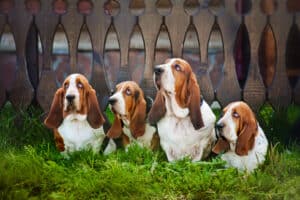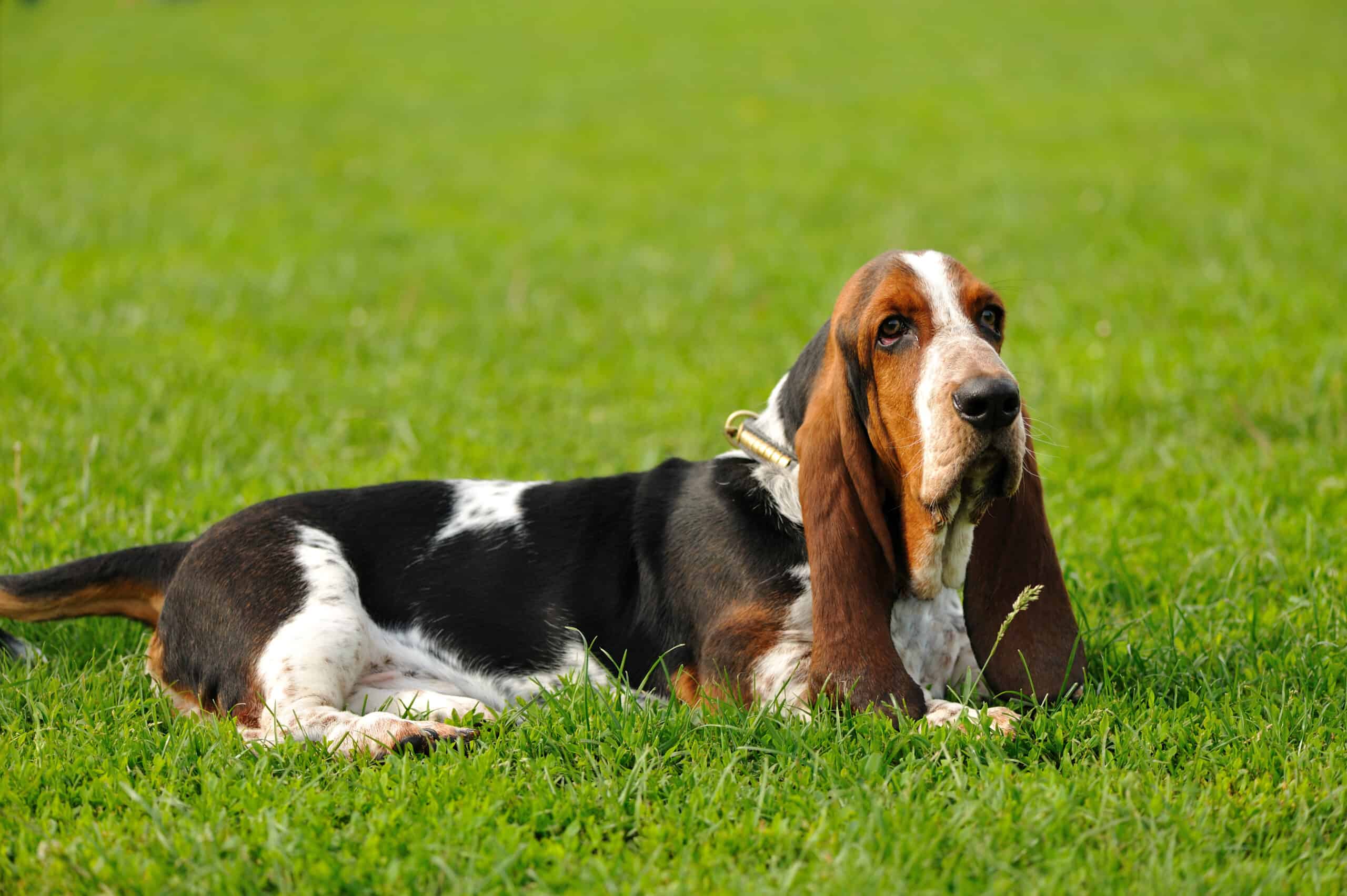Basset Hounds are known for their laid-back temperament, but are Basset Hounds lazy?
The answer is not as simple as a yes or no. While Basset Hounds are not the most energetic breed, they are not inherently lazy.
Understanding Basset Hounds is the key to answering this question. Basset Hounds are scent hounds, which means they were bred for hunting by following a scent trail.
Due to their short legs, Basset Hounds are not the fastest breed, but they are persistent and have an excellent sense of smell.
As a result, they were selectively bred to have a slow and steady pace, making them easy for hunters to keep up with.
This trait has made modern-day Basset Hounds relaxed and laid-back, but it doesn’t mean they are total couch potatoes.
Basset Hounds’ behavior, exercise needs, food and diet, training, health concerns, and grooming needs all play a role in their energy levels and activity levels.
By understanding all of these factors, owners can ensure their Basset Hound is healthy, happy, and active.
Now, let’s take a closer look at what makes Basset Hounds appear lazy and what owners can do to keep them active and healthy.
Table of Contents
Understanding Basset Hounds

Basset Hounds are a medium-sized breed of dog that originated in France. They are known for their heavy bones, short legs, and long, droopy ears.
They typically have a tan and white coat, with variations in shades of brown and black.
Despite their unique appearance, Basset Hounds are friendly and make great family dogs.
They have a calm and gentle temperament, which makes them a popular choice for families with children.
One of the most distinctive features of a Basset Hound is their long, droopy ears.
These ears serve a practical purpose, as they help to trap scents while the dog is hunting.
However, they also make the breed prone to ear infections, so it’s important to keep their ears clean and dry.
Basset Hounds have a reputation for being lazy, but this is not entirely accurate.
While they may not be as energetic as some other breeds, they still require regular exercise to maintain a healthy weight and prevent health problems.
A daily walk or play session in the backyard is usually sufficient.
Basset Hound Behavior – Are Basset Hounds Lazy?
Laid-Back Nature

Basset Hounds are known for their laid-back nature. They have a low energy level and are content to spend their days lounging around the house.
This makes them an excellent choice for families who want a calm and easygoing companion.
They are also known for being affectionate and loyal towards their owners.
Stubbornness
One of the downsides of owning a Basset Hound is their stubbornness. They are independent thinkers and can be difficult to train.
However, with patience and consistency, they can be trained to follow basic commands.
It is important to use positive reinforcement techniques when training a Basset Hound, as they do not respond well to harsh discipline.
Active vs Lazy
While Basset Hounds have a reputation for being lazy, they are actually quite active when they are engaged in activities that interest them.
They have a keen sense of smell and love to follow scents, making them excellent hunting dogs.
However, when they are not engaged in activities that interest them, they can become bored and lazy.
Intelligence
Basset Hounds are intelligent dogs, but they can be stubborn when it comes to training.
They have a tendency to do things on their own terms, which can make them difficult to train.
However, they are quick learners when they are motivated and respond well to positive reinforcement techniques.
Exercise Needs
Basset Hounds have moderate exercise needs of between 30 to 60 minutes daily.
They are not the most active breed and can be prone to laziness, but regular exercise is important for their overall health and well-being.
Taking them for daily walks is a great way to meet their exercise needs. They should be walked on a leash or in a fenced area to prevent them from wandering off.
Basset Hounds love to sniff around and explore, so it’s important to let them take their time and follow their nose during walks.
Playing with them is another way to keep them active and engaged. They enjoy games like fetch and tug-of-war, but be careful not to overdo it as they can easily become exhausted.
It’s important to monitor their weight as they can easily become overweight, which can lead to health problems.
Regular exercise can help prevent obesity and keep them in good shape.
Food and Diet
Basset Hounds are prone to obesity due to their love for food. Therefore, it is essential to monitor their diet and ensure they maintain a healthy weight.
A healthy diet for Basset Hounds should consist of high-quality dog food that is low in calories and fat.
When feeding a Basset Hound, it is important to consider their age, weight, and activity level. Puppies require more protein and fat than adult Basset Hounds.
Therefore, their meals should consist of 25% protein, 5-10% fat, and essential vitamins and minerals.
Adult Basset Hounds should have a diet that consists of 21% protein, 5% fat, and essential vitamins and minerals.
It is also important to avoid overfeeding Basset Hounds. Overfeeding can lead to weight gain and obesity, which can cause health problems such as joint pain, diabetes, and heart disease.
Treats should be given in moderation and should not exceed 10% of their daily calorie intake.
To motivate Basset Hounds to stay active, owners can use treats as a reward during training sessions or playtime.
However, it is important to ensure that the treats are low in calories and fat.
Additionally, owners can take their Basset Hounds for regular walks and engage them in activities such as swimming and hiking to help them maintain a healthy weight.
Training a Basset Hound
Training a Basset Hound can be a challenging task due to their stubborn nature.
However, with patience and consistent training, these dogs can learn a variety of commands and tricks.
Positive reinforcement training is highly recommended as it motivates the dog to learn and obey commands.
When training a Basset Hound, it is important to keep training sessions short and engaging. These dogs have a short attention span and can quickly become bored.
Using toys and treats as rewards during training can help motivate the dog to learn new commands.
Basset Hounds can be stubborn at times, so it is important to remain calm and patient during training.
Yelling or punishing the dog can be counterproductive and may cause the dog to become more stubborn.
Instead, positive reinforcement training can help motivate the dog to learn and obey commands.
It is important to start training a Basset Hound at an early age.
This will help establish good behavior patterns and prevent bad habits from forming.
Consistent training and positive reinforcement can help ensure that the dog is well-behaved and obedient.
Health Concerns
Basset Hounds are generally healthy dogs, but like all breeds, they are prone to certain health conditions.
In this section, we will discuss the most common health concerns that affect Basset Hounds.
Joint Problems
Basset Hounds are a dwarf breed, which means they have short legs and a long body.
This conformation puts them at a higher risk for joint problems, such as hip and elbow dysplasia.
These conditions occur when the joints don’t fit together correctly, causing pain, lameness, and arthritis.
Obesity and excess weight can exacerbate joint problems, so it’s important to keep your Basset Hound at a healthy weight.
Ears and Infections
Basset Hounds have long, droopy ears that can trap moisture, dirt, and debris. This can lead to ear infections, which are painful and can cause hearing loss if left untreated.
To prevent ear infections, it’s important to clean your Basset Hound’s ears regularly and keep them dry.
You should also check your Basset Hound’s ears for signs of infection, such as redness, swelling, or discharge.
Common Health Conditions
Basset Hounds are prone to several eye conditions, including glaucoma and intervertebral disc disease.
Glaucoma is a condition that causes increased pressure in the eye, which can lead to blindness if left untreated.
Intervertebral disc disease is a condition that affects the spinal cord, causing pain, weakness, and paralysis.
Both conditions can be treated if caught early, so it’s important to have your Basset Hound’s eyes checked regularly by a veterinarian.
In addition to these health concerns, Basset Hounds are also prone to obesity, which can exacerbate joint problems and other health conditions.
It’s important to feed your Basset Hound a healthy diet and provide plenty of exercise to keep them at a healthy weight.
Regular veterinary check-ups can help catch any health problems early, so be sure to schedule annual exams for your Basset Hound.
Basset Hounds as Hunting Dogs
Basset Hounds were originally bred in France as hunting dogs. They were specifically bred for their incredible sense of smell and their ability to track prey.
Basset Hounds are a type of scent hound, which means they use their sense of smell to track their prey.
Their sense of smell is so good that they are often used in field trials and scent work competitions. In fact, they have one of the best sense of smell of any dog breed.
They have been known to follow a scent trail for miles and can even track a scent that is several days old.
Basset Hounds were originally bred to hunt hares and rabbits. They were used to track these small animals through fields and forests.
They would use their incredible sense of smell to sniff out the trail of the hare or rabbit and then follow it until they caught up with their prey.
In addition to hunting hares and rabbits, Basset Hounds have also been used to hunt other game such as birds and foxes.
They are particularly good at sniffing out birds that have been shot and fallen to the ground.
They can easily find these birds even if they are hidden in tall grass or underbrush.
Grooming Needs
Basset Hounds have a short, dense coat that sheds moderately throughout the year.
Regular brushing with a soft-bristled brush or a rubber grooming tool can help remove loose hair and prevent matting.
They do not require frequent bathing, and once a month should suffice. Bathing too often can strip the natural oils that nourish their coat and skin.
Drooling is a common trait of Basset Hounds. They tend to drool more when they are excited or after eating or drinking.
To prevent drool from staining their coat, owners should wipe their mouths with a clean cloth or towel regularly.
In addition to regular brushing, owners should also trim their nails regularly and clean their ears to prevent infections.
Basset Hounds have long, floppy ears that can trap dirt and moisture, making them more susceptible to ear infections.
Owners should clean their ears once a week with a gentle ear-cleaning solution and cotton balls.
Frequently Asked Questions
Are Basset Hounds good dogs?
Basset Hounds are known for being friendly, loyal, and affectionate dogs. They have a gentle and laid-back personality, making them great companions for families with children and seniors.
However, they can be stubborn and independent, which can make training a bit of a challenge.
They also have a strong sense of smell and a tendency to follow their nose, so it’s important to keep them on a leash when outside.
Are Basset Hounds good with kids?
Yes, Basset Hounds are generally good with kids. They have a calm and patient demeanor, making them great companions for children.
However, it’s important to supervise interactions between kids and dogs to prevent any accidental injuries.
Basset Hounds are also prone to obesity, so it’s important to monitor their diet and exercise to ensure they stay healthy.
Are Basset Hounds hypoallergenic?
No, Basset Hounds are not hypoallergenic. They shed moderately throughout the year, which can trigger allergies in some people.
Regular grooming and vacuuming can help reduce the amount of hair and dander in the home.
Basset Hound lifespan?
The average lifespan of a Basset Hound is 10-12 years. However, with proper care and nutrition, some Basset Hounds have been known to live up to 14 years.
Do Basset Hounds bark a lot?
Basset Hounds are known for their deep, loud bark. They are vocal dogs and will bark to alert their owners of any perceived threats or to get attention.
However, excessive barking can be a sign of boredom or anxiety, so it’s important to provide them with enough mental and physical stimulation.
What are the disadvantages of Basset Hounds?
Basset Hounds are prone to obesity, which can lead to a range of health problems.
They also have a tendency to follow their nose and wander off, so it’s important to keep them on a leash or in a secure yard.
They can also be stubborn and independent, which can make training a bit of a challenge.
Additionally, they shed moderately throughout the year, which can require regular grooming and cleaning.

